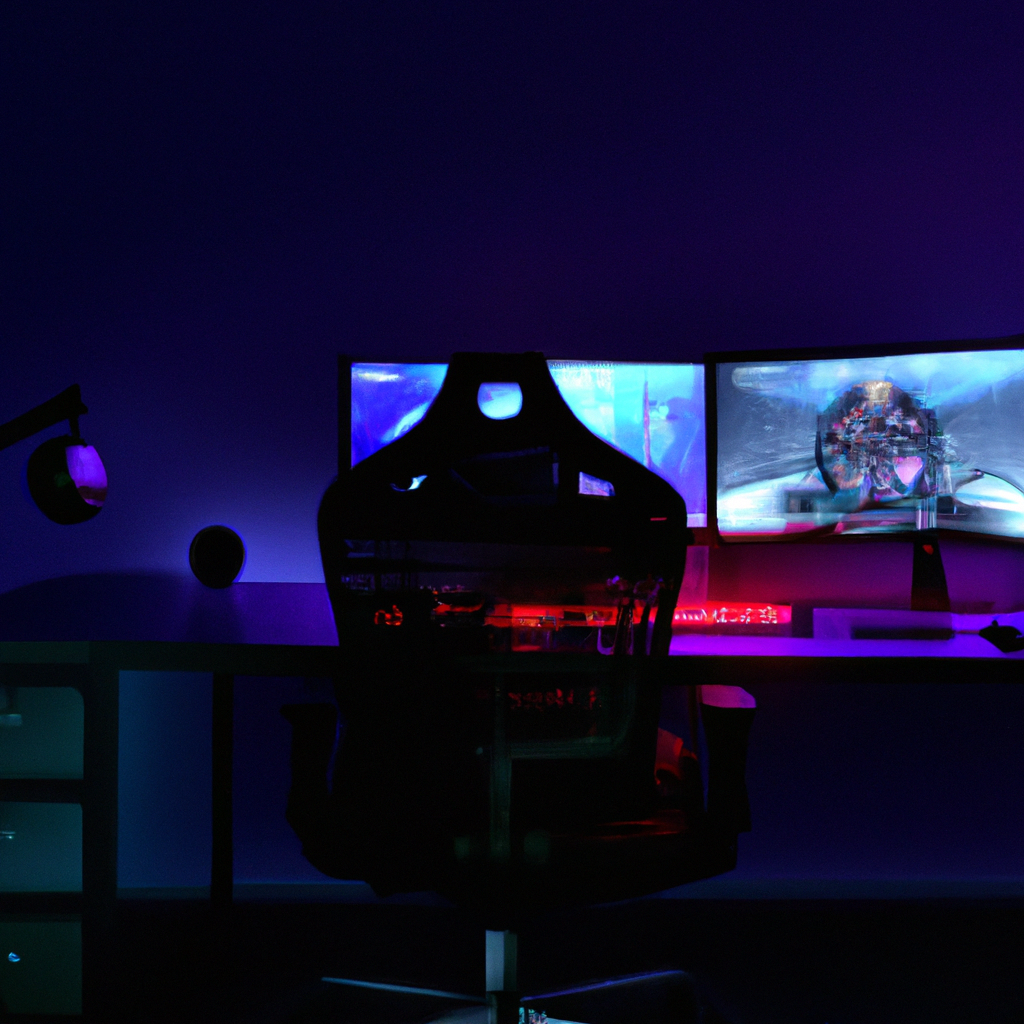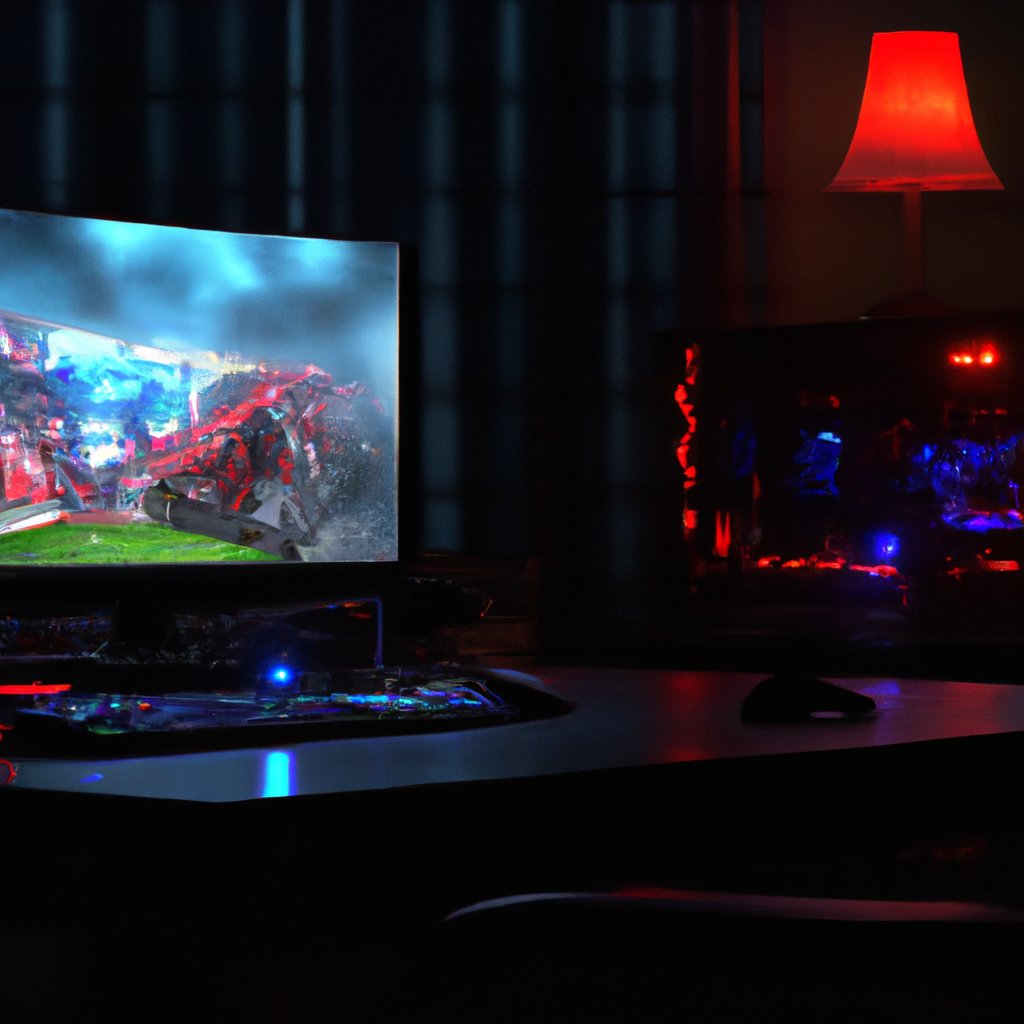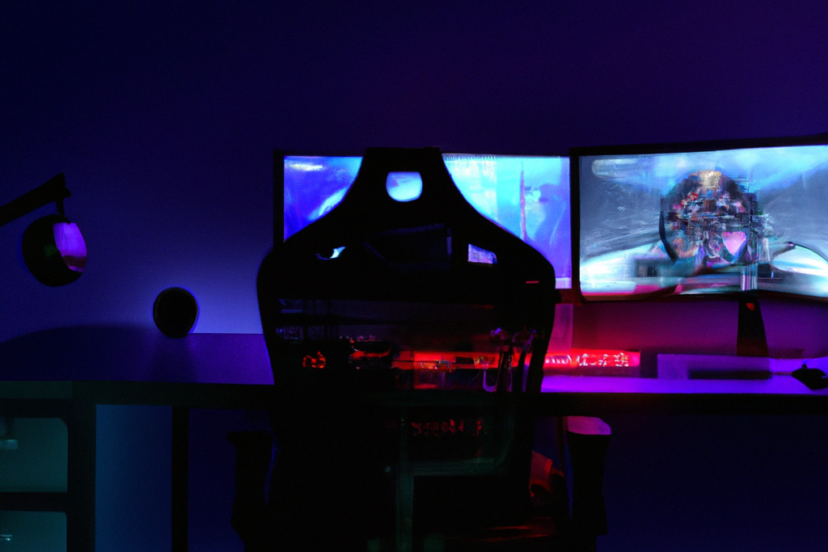How Does Ambient Lighting Affect Gaming? 10 Interesting Ways
How Does Ambient Lighting Affect Gaming: Introduction
The question of “How Does Ambient Lighting Affect Gaming” has become increasingly prominent in the dynamic realm of video games. In today’s gaming landscape, both players and developers are in constant pursuit of more immersive and captivating experiences. Ambient lighting, which encompasses the subtle illumination integrated into the gaming environment, holds the potential to profoundly shape the gaming experience. In this article, we will embark on a comprehensive exploration of the intricate interplay between ambient lighting and gaming. We will examine its multifaceted effects, encompassing gameplay dynamics, immersion levels, and the emotional engagement of players.
The Impact on Gameplay
When we delve into the realm of gameplay, we encounter a domain where the phrase “How Does Ambient Lighting Affect Gaming” resonates with profound significance. Gamers often find themselves navigating intricate virtual worlds, whether it involves battling formidable adversaries or solving complex puzzles.
It is here that the role of ambient lighting becomes most pronounced. Picture a dark and enigmatic gaming environment: the judicious use of ambient lighting can subtly direct a player’s focus towards critical game elements, such as objectives or lurking foes. Conversely, excessive or ill-placed lighting can prove to be a detriment, introducing distractions and hampering the gaming experience. Striking the perfect balance between ambient lighting and the core elements of gameplay is essential for fostering a seamless and enjoyable gaming adventure.
Enhancing Immersion
The marriage between ambient lighting and immersion is where the phrase “How Does Ambient Lighting Affect Gaming” truly shines. Immersion stands as a cornerstone of contemporary gaming experiences, and ambient lighting plays an instrumental role in its attainment. By mirroring real-world lighting conditions, game developers possess the means to transport players to realms both fantastical and futuristic with a striking sense of authenticity.
Consider, for instance, a game set in a post-apocalyptic wasteland. Through the careful manipulation of ambient lighting, developers can imbue the virtual landscape with desaturated colors and dim illumination, effectively conveying a sense of desolation and despair. Conversely, a vibrant and well-lit fantasy world can evoke a feeling of wonder and adventure. It is through the adept use of ambient lighting that players find themselves enveloped in a virtual world, transcending mere spectatorship to become active participants in the game’s narrative.
Emotional Engagement
Emotions serve as a foundational pillar in the realm of gaming, and ambient lighting plays a pivotal role in shaping these emotional landscapes. The ability of ambient lighting to establish the mood and tone of a game is instrumental in evoking powerful emotional responses from players. For instance, within the horror genre, dim and flickering lights are often employed to craft a tense and eerie atmosphere, eliciting fear and anxiety from players.
Conversely, cheerful and well-lit environments can invoke feelings of joy and happiness. Through the artful manipulation of ambient lighting, game developers skillfully craft emotional cues that enable players to forge deep connections with the game’s storyline and characters. Thus, ambient lighting is not merely a technical aspect of game development but rather a masterful tool for eliciting profound emotional engagement from players.
The Importance of Lighting in Gaming
When it comes to gaming, lighting plays a crucial role in enhancing the overall experience. The right ambient lighting can increase immersion, create a more realistic atmosphere, and even impact gameplay. In this article, we’ll explore the different types of ambient lighting, their effects on gameplay, and the role of lighting in competitive gaming. We’ll also discuss how to customize lighting setups for different genres, the benefits and limitations of ambient lighting systems, and future trends in gaming lighting.
Enhancing the Gaming Experience
Ambient lighting has the power to elevate your gaming experience to a whole new level. Whether you’re exploring distant galaxies or escaping from hordes of zombies, the right lighting can make the virtual world feel more real and engaging. It adds depth and dimension to the visuals, making them more vibrant and captivating.

Increasing Immersion and Realism
One of the key benefits of ambient lighting in gaming is its ability to increase immersion and realism. By replicating real-world lighting conditions, it creates a more believable environment for players to explore. Whether it’s the warm glow of sunlight filtering through a forest or the eerie flickering of torches in a dark dungeon, the right lighting can transport you into the game world and make you feel like you’re truly a part of it.
Types of Ambient Lighting
There are different types of ambient lighting that can be used in gaming setups. Understanding these can help you create the perfect lighting environment for your gaming experience.
Natural Lighting
Natural lighting refers to the use of natural light sources, such as sunlight or moonlight, to illuminate your gaming space. This type of lighting can create a sense of realism and authenticity, especially when playing games that are set in outdoor environments. Natural lighting can be achieved by positioning your gaming setup near a window or using curtains and blinds to control the amount of natural light entering the room.
Artificial Lighting
Artificial lighting includes any type of lighting that is not naturally occurring, such as ceiling lights, lamps, or spotlights. This type of lighting gives you more control over the intensity and color temperature, allowing you to create specific atmospheres for different games. You can choose from a wide range of lighting fixtures and bulbs to achieve the desired effect.
LED Lighting
LED lighting has gained popularity in the gaming community due to its versatility and energy efficiency. LED strips can be easily installed behind your monitor or around your gaming setup to add ambient lighting. They come in various colors and can be programmed to change based on game events or your preference. LED lighting not only enhances the visual appeal of your gaming space but also adds another layer of immersion to your gameplay.
Backlighting
Backlighting refers to placing lights behind your TV or monitor to create a soft halo effect. This effect helps reduce eye strain by reducing the contrast between the bright screen and the surrounding dark room. Backlighting also improves the perception of depth in games, making it easier to differentiate between objects in the foreground and background.

Effects of Ambient Lighting on Gameplay
Ambient lighting has a profound impact on gameplay, as it can affect various aspects that contribute to the overall gaming experience.
Visibility and Clarity
Proper lighting ensures that you can clearly see all elements in the game without straining your eyes. Good visibility allows you to distinguish fine details, textures, and colors, enhancing your overall gaming experience. Dim or uneven lighting can make it challenging to spot enemy players, items, or hidden paths, putting you at a disadvantage.
Depth Perception and Spatial Awareness
Ambient lighting can influence your depth perception and spatial awareness in games. By using lighting techniques that create shadows and highlights, it becomes easier to identify the distance between objects and accurately judge their positions. This can be crucial in first-person shooters, where accurately perceiving distances and positions can make or break your gameplay.
Color Perception and Contrast
Color perception plays a vital role in gaming, as it affects the visual appeal and the ability to differentiate between objects. Ambient lighting can enhance color perception by providing adequate lighting conditions and the right color temperature. It also improves contrast, making it easier to distinguish between different shades and hues in the game.
Eye Strain and Fatigue
Poor lighting and excessive screen time can cause eye strain and fatigue, leading to discomfort and decreased performance. Ambient lighting can help alleviate these issues by providing a balanced level of illumination and reducing the contrast between the bright screen and the surrounding environment. This allows for longer and more comfortable gaming sessions.
Impact of Ambient Lighting on Mood and Emotions
Beyond its impact on gameplay, ambient lighting can also influence your mood and emotions while gaming.
Creating an Atmosphere
The lighting in a game sets the mood and atmosphere, helping to immerse you in the game world. From the dimly lit corridors of a horror game to the vibrant and colorful landscapes of a fantasy adventure, the right lighting can make you feel the intended emotions and intensify your connection to the game.
Enhancing Tension and Suspense
Ambient lighting can be used strategically to enhance tension and suspense in games. By adjusting the lighting to be darker or more intense during critical moments, the game developers can create a sense of anticipation and amplify the emotional impact of the gameplay. This adds an extra layer of excitement and immerses you even further in the game.

The Role of Lighting in Competitive Gaming
Lighting not only impacts your gaming experience but also plays a crucial role in competitive gaming.
Improving Reaction Times
In fast-paced competitive games, lighting can affect your reaction times. Bright and clear lighting allows for quicker visual processing, enabling you to react faster to in-game events. It reduces the risk of missing important cues or enemies, giving you a competitive edge.
Optimizing Performance and Focus
The right lighting environment can enhance your performance and focus during intense gaming sessions. Proper lighting reduces distractions, eye strain, and fatigue, allowing you to concentrate solely on the game. When every second counts, having optimal lighting conditions can significantly improve your gameplay and increase your chances of success.
Customizing Ambient Lighting for Different Genres
Different genres of games often require different lighting setups to enhance the intended experience.
Horror Games
Horror games rely heavily on darkness, shadows, and jump scares to create a sense of fear and suspense. Dim and atmospheric lighting, combined with strategic use of shadows, can intensify the horror elements and make you feel more immersed in the terrifying game world.
Action Games
Action games, such as first-person shooters or fighting games, benefit from bright and clear lighting that allows for quick reactions and accurate perception of details. Ensuring good visibility without harsh lighting can enhance your gameplay and give you a competitive advantage.
Adventure Games
Adventure games often feature visually stunning landscapes and intricate environments. Customizing ambient lighting to match the mood and atmosphere of each location can amplify the sense of exploration and wonder as you traverse through the game world.
Simulation Games
Simulation games, like racing or flight simulators, aim to provide a realistic experience. Using natural lighting or replicating the lighting conditions of the real-world environments in these games can enhance the immersion and make you feel like you’re truly behind the wheel or in the cockpit.

Choosing the Right Lighting Setup for Gaming
When selecting the right lighting setup for your gaming space, there are a few factors to consider.
Consideration of Room Size and Layout
The size and layout of your gaming room play a role in determining the most effective lighting setup. Larger rooms may require more lighting fixtures to ensure consistent illumination, while smaller rooms may benefit from strategic placement of lights to avoid harsh glare or shadows.
Optimal Lighting Positions
Positioning your lighting fixtures correctly is crucial for achieving the desired effect. Lights placed behind or beside your gaming setup can reduce eyestrain, while lights positioned above can provide overall illumination. Experimenting with different positions will help you find the optimal setup for your specific gaming needs.
Adjustable Lighting Options
Having adjustable lighting options can provide flexibility for different games and situations. Being able to adjust the color temperature, intensity, and even synchronize lighting with game events can enhance your gaming experience and further immerse you in the virtual world.
Incorporating RGB Lighting in Gaming Environments
RGB lighting has become increasingly popular in gaming environments due to its ability to add a vibrant and customizable aesthetic.
Enhancing Aesthetics
RGB lighting adds a dynamic and visually appealing element to your gaming setup. With the ability to change colors and effects, it allows for personalization and can complement the overall theme or design of your gaming room. From subtle and calming colors to intense and vibrant displays, RGB lighting adds a touch of style to your gaming environment.
Syncing Lighting with Game Events
Many games now support RGB lighting integration, where the lighting in your gaming setup reacts to in-game events. For example, when your character takes damage, the lights may flash red, or when you level up, they may change to a celebratory color. This synchronization further immerses you in the game and enhances the overall experience.

Benefits and Limitations of Ambient Lighting Systems
While there are numerous benefits to incorporating ambient lighting into your gaming setup, there are also some limitations to consider.
Enhanced Visual Experience
The primary benefit of ambient lighting systems is the enhanced visual experience they provide. From improved visibility to heightened immersion, the right lighting setup can make gaming more enjoyable and engaging.
High Costs and Installation
Implementing ambient lighting systems can often come with a high upfront cost, especially if you opt for high-quality fixtures or smart lighting solutions. Additionally, depending on the complexity of the installation, you may need professional assistance or expert knowledge to ensure the lighting is properly set up.
Compatibility Issues
Compatibility can be a challenge when integrating an ambient lighting system with your gaming setup. Some lighting systems may not be compatible with your gaming platform or require additional software or hardware to function properly. It’s important to research and ensure compatibility before investing in an ambient lighting system.
Future Trends in Ambient Lighting for Gaming
As technology continues to advance, the future of ambient lighting looks promising for gamers.
AI-Driven Ambient Lighting
With the rise of artificial intelligence (AI) in gaming, ambient lighting systems can become smarter and more responsive. AI algorithms can analyze gameplay patterns, emotions, and environmental factors in real-time, adjusting the lighting accordingly. For example, if a game senses a player’s increasing tension, it could subtly intensify the ambient lighting to enhance the suspense.
Biometric Feedback Integration
The future of ambient lighting may see the integration of biometric feedback systems. These systems could monitor a player’s heart rate, perspiration, and other physiological cues to adapt the ambient lighting to their emotional state. If a player becomes particularly anxious during a tense moment in the game, the lighting could shift to calm, soothing colors to mitigate stress.
Cross-Platform Compatibility
As gaming ecosystems expand across various platforms, including consoles, PCs, and mobile devices, the future of ambient lighting might involve greater cross-platform compatibility. Gamers could enjoy consistent ambient lighting experiences, whether they are playing on a high-end gaming PC or a mobile device, providing a seamless transition between different gaming environments.
Eco-Friendly Lighting Solutions
In an era of increased environmental consciousness, gaming companies may embrace eco-friendly ambient lighting solutions. LED technology has already made strides in reducing energy consumption, and future developments could lead to even more sustainable options. Gamers of the future might enjoy immersive experiences with minimal impact on the environment.
Embracing the Luminary Future of Gaming
The evolution of ambient lighting in gaming is a testament to the industry’s relentless pursuit of innovation. From enhancing gameplay dynamics to immersing players in fantastical worlds and evoking deep emotions, ambient lighting has proven its transformative power. As we peer into the horizon of gaming’s future, we see a luminous path paved with exciting possibilities.
Virtual reality integration promises to transport gamers into entirely new dimensions, while dynamic lighting systems will make our digital experiences more interactive and engaging. AI-driven ambient lighting, coupled with biometric feedback, will craft experiences that adapt to our emotions and physiological responses. Cross-platform compatibility ensures that gamers can savor their ambient lighting experiences regardless of the devices they use.
In this bright future, we also anticipate a commitment to eco-friendly solutions, ensuring that the radiance of gaming doesn’t come at the cost of our planet. As technology continues to advance and creative minds push the boundaries of what’s possible, ambient lighting will remain a guiding star, illuminating the way to unforgettable gaming experiences.
So, as we embark on this journey through the evolving world of gaming and ambient lighting, let us embrace the luminary future that awaits us—a future where the boundaries between reality and the virtual world blur, where emotions are painted in light and color, and where gaming becomes an even more captivating and transformative experience.
How Does Ambient Lighting Affect Gaming: Conclusion
In the grand tapestry of gaming, the question, “How Does Ambient Lighting Affect Gaming,” is not just a query; it is a profound exploration of the nuances that make the virtual world come alive. As we navigate this journey through the interplay between ambient lighting and gaming, it becomes apparent that ambient lighting is not a mere accessory; it’s a transformative force.
In this ever-evolving landscape, where pixels and imagination collide, the significance of ambient lighting cannot be overstated. It shapes gameplay, lending depth and context to every move a player makes. It heightens immersion, turning digital landscapes into tangible, emotionally charged realms. It sparks emotions, making us laugh, cry, and jump in fear as we interact with virtual universes.
As technology marches forward, we can only anticipate that the relationship between ambient lighting and gaming will continue to evolve. New innovations will push the boundaries of what’s possible, promising even more awe-inspiring experiences for gamers.
So, to return to our question: “How Does Ambient Lighting Affect Gaming?” The answer is clear—it affects it profoundly. It’s the unseen hand that guides our adventures, the silent narrator of our virtual tales, and the painter of our emotional landscapes. As we continue to explore and expand the horizons of gaming, ambient lighting will remain a steadfast companion, illuminating our path into the future of interactive storytelling and immersive adventures.




